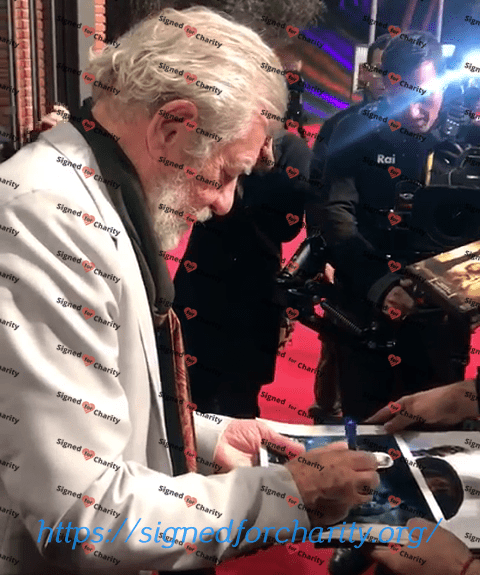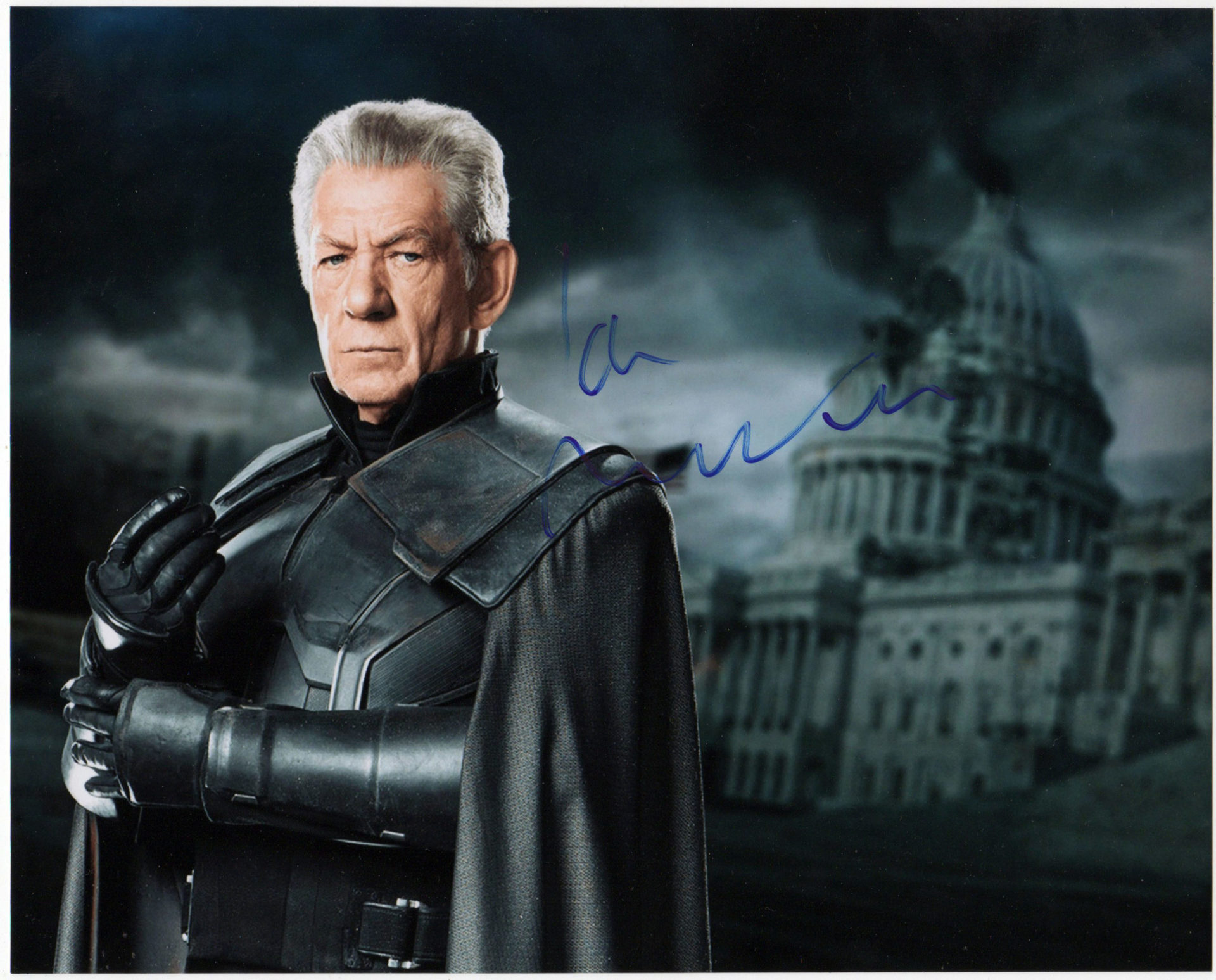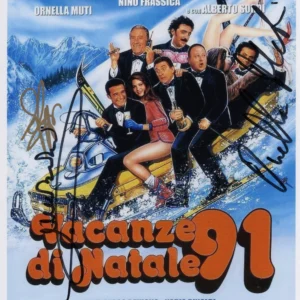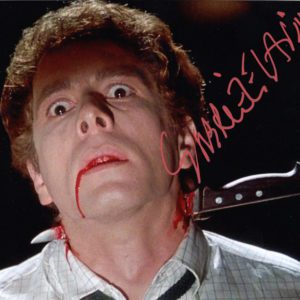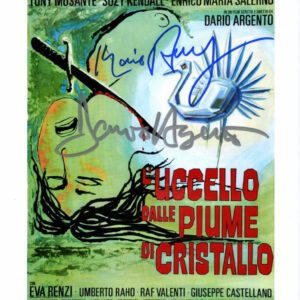Description
McKellen was born on 25 May 1939 in Burnley, Lancashire, the son of Margery Lois (née Sutcliffe) and Denis Murray McKellen. He was their second child, with a sister, Jean, five years his senior. Shortly before the outbreak of the Second World War in September 1939, his family moved to Wigan. They lived there until Ian was twelve years old, before relocating to Bolton in 1951, after his father had been promoted. The experience of living through the war as a young child had a lasting impact on him, and he later said that “only after peace resumed … did I realise that war wasn’t normal.” When an interviewer remarked that he seemed quite calm in the aftermath of the 11 September attacks, McKellen said: “Well, darling, you forget—I slept under a steel plate until I was four years old.” McKellen’s father was a civil engineer and lay preacher, and was of Protestant Irish and Scottish descent. Both of McKellen’s grandfathers were preachers, and his great-great-grandfather, James McKellen, was a “strict, evangelical Protestant minister” in Ballymena, County Antrim. His home environment was strongly Christian, but non-orthodox. “My upbringing was of low nonconformist Christians who felt that you led the Christian life in part by behaving in a Christian manner to everybody you met.” When he was 12, his mother died of breast cancer; his father died when he was 24. After his coming out as gay to his stepmother, Gladys McKellen, who was a Quaker, he said, “Not only was she not fazed, but as a member of a society which declared its indifference to people’s sexuality years back, I think she was just glad for my sake that I wasn’t lying anymore.” His great-great-grandfather Robert J. Lowes was an activist and campaigner in the ultimately successful campaign for a Saturday half-holiday in Manchester, the forerunner to the modern five-day work week, thus making Lowes a “grandfather of the modern weekend”. McKellen attended Bolton School (Boys’ Division), of which he is still a supporter, attending regularly to talk to pupils. McKellen’s acting career started at Bolton Little Theatre, of which he is now the patron. An early fascination with the theatre was encouraged by his parents, who took him on a family outing to Peter Pan at the Opera House in Manchester when he was three. When he was nine, his main Christmas present was a fold-away wood and bakelite Victorian theatre from Pollocks Toy Theatres, with cardboard scenery and wires to push on the cut-outs of Cinderella and of Laurence Olivier’s Hamlet. His sister took him to his first Shakespeare play, Twelfth Night, by the amateurs of Wigan’s Little Theatre, shortly followed by their Macbeth and Wigan High School for Girls’ production of A Midsummer Night’s Dream, with music by Mendelssohn, with the role of Bottom played by Jean McKellen, who continued to act, direct, and produce amateur theatre until her death. In 1958, McKellen, at the age of 18, won a scholarship to St Catharine’s College, Cambridge, where he read English literature. He has since been made an Honorary Fellow of the College. While at Cambridge, McKellen was a member of the Marlowe Society, where he appeared in 23 plays over the course of 3 years. At that young age he was already giving performances that have since become legendary such as his Justice Shallow in Henry IV alongside Trevor Nunn and Derek Jacobi (March 1959), Cymbeline (as Posthumus, opposite Margaret Drabble as Imogen) and Doctor Faustus. During this period McKellen had already been directed by Peter Hall, John Barton and Dadie Rylands, all of whom would have a significant impact on McKellen’s future career.
Theatre
1965–1969: Theatre debut and early roles
McKellen made his first professional appearance in 1961 at the Belgrade Theatre, as Roper in A Man for All Seasons, although an audio recording of the Marlowe Society’s Cymbeline had gone on commercial sale as part of the Argo Shakespeare series. After four years in regional repertory theatres, McKellen made his first West End appearance, in A Scent of Flowers, regarded as a “notable success”. In 1965 he was a member of Laurence Olivier’s National Theatre Company at the Old Vic, which led to roles at the Chichester Festival. With the Prospect Theatre Company, McKellen made his breakthrough performances of Richard II (directed by Richard Cottrell) and Marlowe’s Edward II (directed by Toby Robertson) at the Edinburgh festival in 1969, the latter causing a storm of protest over the enactment of the homosexual Edward’s lurid death.
1970–1985: National Theatre roles and Broadway debut
In the 1970s, McKellen became a well-known figure in British theatre, performing frequently at the Royal Shakespeare Company and the Royal National Theatre, where he played several leading Shakespearean roles. Through 1973 to 1974, McKellen toured the United Kingdom and Brooklyn Academy of Music portraying Lady Wishfort’s Footman, Kruschov, and Edgar in the William Congreve comedy The Way of the World, Anton Chekov’s comedic three act play The Wood Demon and William Shakespeare tragedy King Lear. The following year, he starred in Shakespeare’s King John, George Colman’s The Clandestine Marriage, and George Bernard Shaw’s Too True to Be Good. From 1976 to 1977 he portrayed Romeo in the Shakespeare romance Romeo & Juliet at the Royal Shakespeare Theatre. The following year he played King Leontes in The Winter’s Tale. In 1976, he played the title role in William Shakespeare’s Macbeth (which he had first played for Trevor Nunn in a “gripping…out of the ordinary” production, with Judi Dench, at Stratford in 1976 and Iago in Othello, in award-winning productions directed by Nunn. Both of these productions were adapted into television films, also directed by Nunn. In 1978 through 1979 he toured in a double feature production of Shakespeare’s Twelfth Night, and Anton Chekov’s Three Sisters portraying Sir Toby Belch and Andrei, respectively. In 1979, McKellen gained acclaim for his role as Antonio Salieri in the Broadway transfer production of Peter Shaffer’s play Amadeus. The play was an immensely popular play produced by the National Theatre originally starring Paul Scofield. The transfer starred McKellen, Tom Hulce as Wolfgang Amadeus Mozart, and Jane Seymour as Constanze Mozart. The New York Times theatre critic Frank Rich wrote of McKellen’s performance “In Mr. McKellen’s superb performance, Salieri’s descent into madness was portrayed in dark notes of almost bone-rattling terror.” For his performance, McKellen received the Tony Award for Best Actor in a Play.
1986–2001: Roles on Broadway and the West End
In 1986, he returned to Broadway in revival of Anton Chekhov’s first play Wild Honey alongside Kim Cattrall and Kate Burton. The play concerned a local Russian schoolteacher who struggles to remain faithful to his wife, despite the attentions of three other women. McKellen received mixed reviews from critics in particular Frank Rich of The New York Times who praised him for his “bravura and athletically graceful technique that provides everything except, perhaps, the thing that matters most – sustained laughter.” He later wrote, “Mr. McKellen finds himself in the peculiar predicament of the star who strains to carry a frail supporting cast.” In 1989 he played Iago in production of Othello by the Royal Shakespeare Company. From 1990 to 1992, he acted in a world tour of a lauded revival of Richard III, playing the title character. The production played at the Brooklyn Academy of Music for two weeks before continuing its tour where Frank Rich of New York Times was able to review it. In his piece, he praised McKellen’s performance writing, “Mr. McKellen’s highly sophisticated sense of theatre and fun drives him to reveal the secrets of how he pulls his victims’ strings whether he is addressing the audience in a soliloquy of not”. For his performance he received the Laurence Olivier Award for Best Actor. In 1992, he acted in Pam Gems’ revival of Chekov’s Uncle Vanya at the Royal National Theatre alongside Antony Sher, and Janet McTeer. From 1993 to 1997 McKellen toured in a one man show entitled, A Knights Out, about coming out as a gay man. Laurie Winer from The Los Angeles Times wrote, “Even if he is preaching to the converted, McKellen makes us aware of the vast and powerful intolerance outside the comfortable walls of the theater. Endowed with a rare technique, he is a natural storyteller, an admirable human being and a hands-on activist.” From 1997 to 1998, he starred as Dr. Tomas Stockmann in a revival of Henrik Ibsen’s An Enemy of the People. Later that year he played Garry Essendine in the Noël Coward comedy Present Laughter at the West Yorkshire Playhouse. McKellen returned to the Broadway stage in 2001 in a August Strindberg play The Dance of Death alongside Helen Mirren, and David Strathairn at the Broadhurst Theatre. The New York Times Theatre critic Ben Brantley praised McKellen’s performance writing, ” returns to Broadway to serve up an Elysian concoction we get to sample too little these days: a mixture of heroic stage presence, actorly intelligence, and rarefied theatrical technique”. McKellen toured with the production at the Lyric Theatre in London’s West End and to the Sydney Art’s Festival in Australia.
In 2007, he returned to the Royal Shakespeare Company, in productions of King Lear and The Seagull, both directed by Trevor Nunn. In 2009, he appeared in a very popular revival of Waiting for Godot at London’s Haymarket Theatre, directed by Sean Mathias, and playing opposite Patrick Stewart. From 2013 to 2014, McKellen and Stewart starred in a double production of Samuel Beckett’s Waiting for Godot and Harold Pinter’s No Man’s Land on Broadway at the Cort Theatre. Variety theatre critic Marilyn Stasio praised the dual production writing, “McKellen and Stewart find plenty of consoling comedy in two masterpieces of existential despair.” In both production of Stasio claims, “the two thespians play the parts they were meant to play.” He is Patron of English Touring Theatre and also President and Patron of the Little Theatre Guild of Great Britain, an association of amateur theatre organisations throughout the UK. In late August 2012, he took part in the opening ceremony of the London Paralympics, portraying Prospero from The Tempest. In October 2017, McKellen played King Lear at Chichester Festival Theatre, a role which he said was likely to be his “last big Shakespearean part”. He performed the play at the Duke of York’s Theatre in London’s West End during the summer of 2018. To celebrate his 80th birthday, in 2019 McKellen performed in a one man stage show titled Ian McKellen on Stage: With Tolkien, Shakespeare, Others and YOU celebrating the various performances throughout his career. The show toured across the UK and Ireland (raising money for each venue and organisation’s charity) before a West End run at the Harold Pinter Theatre and was performed for one night only on Broadway at the Hudson Theatre. In 2021, he will play the title role in an age-blind production of Hamlet (having previously played the part in a UK and European tour in 1971), followed by playing Firs The Cherry Orchard at the Theatre Royal, Windsor. He will also play the role of Firs in Chekov’s The Cherry Orchard also at the Theatre Royal.
1969–1989: Film debut and character actor
In 1969, McKellen starred in three films, Michael Hayes’ The Promise, Clive Donner’s epic film Alfred the Great, and Waris Hussein’s A Touch of Love. In 1981, McKellen portrayed writer and poet D. H. Lawrence in the Christopher Miles directed biographical film, Priest of Love. He followed up with Michael Mann’s horror film The Keep (1983). In 1985, he starred in the Plenty the film adaptation of the David Hare play of the same name. The film was directed by Fred Schepisi and starred Meryl Streep, Charles Dance, John Geilgud, and Sting. The spans nearly 20 years from the early 1940s to the 1960s, around an Englishwoman’s experiences as a fighter for the French Resistance during World War II when she has a one-night stand with a British intelligence agent. The film received mixed review with Roger Ebert of The Chicago Sun-Times praising the film’s ensemble cast writing, “The performances in the movie supply one brilliant solo after another; most of the big moments come as characters dominate the scenes they are in.” McKellen starred in the British drama Scandal a fictionalised account of the Profumo affair that rocked the government of British prime minister Harold Macmillan. McKellen portrayed John Profumo. The film starred Joanne Whalley, and John Hurt. The film premiered at the 1989 Cannes Film Festival and competed for the Palme d’Or.1990–1998: Richard III and Critical acclaim
In 1993, he starred in the film Six Degrees of Separation based on the Pulitzer Prize and Tony Award nominated play of the same name. McKellen starred alongside Will Smith, Donald Sutherland and Stockard Channing. The film was a critical success. That same year, he also appeared in the western The Ballad of Little Jo opposite Bob Hoskins and the action comedy Last Action Hero starring Arnold Schwarzenegger. The following year, he appeared in the superhero film The Shadow with Alec Baldwin and the James L. Brooks directed comedy I’ll Do Anything starring Nick Nolte. In 1995, McKellen made his screenwriting debut with Richard III, an ambitious adaptation of William Shakespeare’s play of the same name, directed by Richard Loncraine. The film reimagines the play’s story and characters to a setting based on 1930s Britain, with Richard depicted as a fascist plotting to usurp the throne. McKellen stars in the title role alongside an ensemble cast including Annette Bening, Robert Downey Jr., Jim Broadbent, Kristen Scott Thomas, Nigel Hawthorne and Dame Maggie Smith. As executive producer he returned his £50,000 fee to complete the filming of the final battle. In his review of the film, The Washington Post film critic Hal Hinson called McKellen’s performance a “lethally flamboyant incarnation” and said his “florid mastery … dominates everything”. Film critic Roger Ebert of the Chicago Sun-Times praised McKellen’s adaptation and his performance in his four star review writing, “McKellen has a deep sympathy for the playwright…Here he brings to Shakespeare’s most tortured villain a malevolence we are moved to pity. No man should be so evil, and know it. Hitler and others were more evil, but denied out to themselves. There is no escape for Richard. He is one of the first self-aware characters in the theater, and for that distinction he must pay the price.” His performance in the title role garnered BAFTA and Golden Globe nominations for Best Actor and won the European Film Award for Best Actor. His screenplay was nominated for the BAFTA Award for Best Adapted Screenplay. That same year, he appeared in the historical drama Restoration (1995) also starring Downey Jr., as well as Meg Ryan, Hugh Grant, and David Thewlis. He also appeared in the British romantic comedy Jack and Sarah (1995) starring Richard E. Grant, Samantha Mathis, and Dame Judi Dench. In 1998, he appeared in the modestly acclaimed psychological thriller Apt Pupil, which was directed by Bryan Singer and based on a story by Stephen King. McKellen portrayed a fugitive Nazi officer living under a false name in the US who is befriended by a curious teenager (Brad Renfro) who threatens to expose him unless he tells his story in detail. That same year, he played James Whale, the director of Frankenstein in the Bill Condon directed period drama Gods and Monsters, a role for which he was subsequently nominated for the Academy Award for Best Actor, losing it to Roberto Benigni in Life is Beautiful (1998).
2000–2007: The Lord of the Rings and X-Men
In 1999, McKellen was cast, again under the direction of Bryan Singer, to play the comic book supervillain Magneto in the 2000 film X-Men and its sequels X2: X-Men United (2003) and X-Men: The Last Stand (2006). He later reprised his role of Magneto in 2014’s X-Men: Days of Future Past, sharing the role with Michael Fassbender, who played a younger version of the character in 2011’s X-Men: First Class. While filming the first X-Men film in 1999, McKellen was cast as the wizard Gandalf in Peter Jackson’s film trilogy adaptation of The Lord of the Rings (consisting of The Fellowship of the Ring, The Two Towers, and The Return of the King), released between 2001 and 2003. He received honours from the Screen Actors Guild for Best Supporting Actor in a Motion Picture for his work in The Fellowship of the Ring and was nominated for the Academy Award for Best Supporting Actor for the same role. He provided the voice of Gandalf for several video game adaptations of the Lord of the Rings films. McKellen has appeared in limited release films, such as Emile (which was shot in three weeks following the X2 shoot), Neverwas and Asylum. In 2006, He appeared as Sir Leigh Teabing in The Da Vinci Code opposite Tom Hanks as Robert Langdon. During a 17 May 2006 interview on The Today Show with the Da Vinci Code cast and director Ron Howard, Matt Lauer posed a question to the group about how they would have felt if the film had borne a prominent disclaimer that it is a work of fiction, as some religious groups wanted. McKellen responded, “I’ve often thought the Bible should have a disclaimer in the front saying ‘This is fiction.’ I mean, walking on water? It takes… an act of faith. And I have faith in this movie – not that it’s true, not that it’s factual, but that it’s a jolly good story.” He continued, “And I think audiences are clever enough and bright enough to separate out fact and fiction, and discuss the thing when they’ve seen it”. In 2007, McKellen narrated the romantic fantasy adventure film Stardust starring Charlie Cox and Claire Danes which was a critical and financial success. That same year, he lent his voice to the armored bear Iorek Byrnison in the Chris Weitz-directed fantasy film The Golden Compass based on the acclaimed Philip Pullman novel Northern Lights and starred Nicole Kidman and Daniel Craig. The film received mixed reviews but was a financial success.
2012–2019: The Hobbit, X-Men and other roles
McKellen reprised the role of Gandalf on screen in Peter Jackson’s three-part film adaptation of The Hobbit starting with The Hobbit: An Unexpected Journey (2012), followed by The Hobbit: The Desolation of Smaug (2013), and finally The Hobbit: The Battle of the Five Armies (2014). Despite the series receiving mixed reviews, it emerged as a financial success. McKellen also reprised his dual role as Erik Lehnsherr and Magneto in James Mangold’s The Wolverine (2013), and Singer’s X-Men: Days of Future Past (2014). In 2015, McKellen reunited with director Bill Condon playing an elderly Sherlock Holmes in the mystery film Mr. Holmes alongside Laura Linney. In the film based on the novel A Slight Trick of the Mind (2005), Holmes now 93, struggles to recall the details of his final case because his mind is slowly deteriorating. The film premiered at the 65th Berlin International Film Festival with McKellen receiving acclaim for his performance. Rolling Stone film critic Peter Travers praised his performance writing, “Don’t think you can take another Hollywood version of Sherlock Holmes? Snap out of it. Apologies to Robert Downey Jr. and Benedict Cumberbatch, but what Ian McKellen does with Arthur Conan Doyle’s fictional detective in Mr. Holmes is nothing short of magnificent…Director Bill Condon, who teamed superbly with McKellen on the Oscar-winning Gods and Monsters, brings us a riveting character study of a lion not going gentle into winter.” In 2017, McKellen portrayed in a supporting role as Cogsworth (originally voiced by David Ogden Stiers in the 1991 animated film) in the live-action adaptation of Disney’s Beauty and the Beast, directed by Bill Condon (which marked the third collaboration between Condon and McKellen, after Gods and Monsters and Mr. Holmes) and co-starred alongside Emma Watson and Dan Stevens. The film was released to positive reviews and grossed $1.2 billion worldwide, making it the highest-grossing live-action musical film, the second highest-grossing film of 2017, and the 17th highest-grossing film of all time. The following year, he appeared in Kenneth Branagh’s historical drama All is True (2018) portraying Henry Wriothesley, 3rd Earl of Southampton, opposite Branagh and Judi Dench. In 2019, he reunited with Condon for a fourth time in the mystery thriller The Good Liar opposite Helen Mirren, who received praise for their onscreen chemistry. That same year, he appeared as Gus the Theatre Cat in the ill fated movie musical adaptation of Cats directed by Tom Hooper. The film featured performances from Jennifer Hudson, James Corden, Rebel Wilson, Idris Elba, and Judi Dench. The film was widely panned for its poor visual effects, editing, performances, screenplay, and was a box office disaster.

